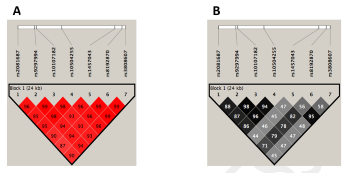Cholesterol 7 alpha-hydroxylase (CYP7A1) gene polymorphisms are associated with increased LDL-cholesterol levels and the incidence of subclinical atherosclerosis
DOI:
https://doi.org/10.17305/bb.2024.10764Keywords:
Genetics, susceptibility, subclinical atherosclerosis, cholesterol 7 alpha-hydroxylaseAbstract
The cholesterol 7 alpha-hydroxylase (CYP7A1) enzyme plays an important role in the conversion of cholesterol to bile acid, contributing to the reduction of cholesterol plasma levels in normal conditions. Nonetheless, recent studies have shown that some genetic variants in the enhancer and promoter regions of the CYP7A1 gene reduce the expression of the CYP7A1 enzyme, increasing plasma lipid levels, as well as the risk of developing coronary heart disease. The aim of this work was to explore whether the genetic variants (rs2081687, rs9297994, rs10107182, rs10504255, rs1457043, rs8192870, and rs3808607) of the CYP7A1 gene are involved in subclinical atherosclerosis and plasma lipid levels. We included 416 patients with subclinical atherosclerosis (SA) with coronary artery calcium (CAC) greater than zero, and 1046 controls with CAC = 0. According to the inheritance models (co-dominant, dominant, recessive, over-dominant and additive), the homozygosity of the minor allele frequencies of 7 analyzed polymorphisms showed a high incidence of SA (P < 0.05). In a sub-analysis performed including only the patients with SA, the same SNPs were associated with increased low-density lipoprotein cholesterol (LDL-C) levels. On the other hand, our findings showed that the haplotype (TGCGCTG) increases the risk of developing SA (P < 0.05). In conclusion, the rs2081687, rs9297994, rs10107182, rs10504255, rs1457043, rs8192870, and rs3808607 polymorphisms of CYP7A1 confer a risk of developing SA and elevated LDL-C levels. Our results suggest that the CYP7A1 is involved in the incidence of SA through the increase in the plasma lipid profile.
Citations
Downloads

Downloads
Additional Files
Published
Issue
Section
Categories
License
Copyright (c) 2024 Gilberto Vargas-Alarcón, Rosalinda Posadas-Sánchez, Oscar Peréz-Méndez, José Manuel Fragoso

This work is licensed under a Creative Commons Attribution 4.0 International License.









